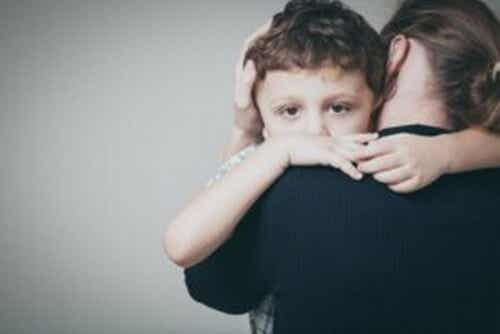As a rule, parents are the main points of reference for the child. As a result, if a parent has a mental disorder, the child's emotional development is likely to be significantly affected.

Last update: April 04, 2022
More than a billion people worldwide suffer from a mental disorder. This figure is estimated to be much higher as many cases go undiagnosed. For the same reason, many children suffer the consequences of growing up with parents with a psychological disorder, which in many cases marks its character, personality and development.
It is not possible to generalize, but growing up with someone with some kind of psychological disorder has a huge impact. Let's see how this situation can affect a child's development.
Growing up with parents with a psychological disorder: what consequences?
Bond of attachment
The bond of attachment is the relationship of primary affection that is established between the child and his main figures of reference. This it consolidates according to the degree to which adults respond to the child's requests and meet his needs.
If they provide affection and security appropriately, a secure bond is established that allows the child to develop a healthy personality.
When one parent has a psychological disorder, they may not be able to care for them properly. He may be unable to recognize her needs or respond to them in the right way.
If you neglect the child physically, emotionally or psychologically (or if you are inconsistent in offering your care), insecure attachment will be established. The child will therefore grow up feeling helpless and in danger.
The parenting style
Parenting style plays an important role in the formation of the child's personality. It has been established that a democratic education is the most appropriate for proper development. However, for the parent with a mental disorder, it may be nearly impossible.
Often adults suffering from anxiety disorders over-protect their children, thus limiting the development of their autonomy and acting as a burden for confidence in their own possibilities. It is also possible that they fall into authoritarian behavior, maintaining a level of demand that is too high.
On the other hand, those suffering from severe depression or other conditions may not be emotionally available. This it can deprive the child of the presence, affection and limitations they need.
Raising a child is a complex task that requires awareness and dedication; and when you have to face your difficulties, it is difficult to act optimally.
Social learning
Vicarious learning is one of the most relevant phenomena during growth. This means that the minor acquires attitudes, strategies and tools by observing how parents behave.
It is dangerous to the extent that parental dysfunctional thinking patterns can be passed on to children.
A pessimistic view, a feeling of victimhood, accumulation of fears and insecurities, as well as inadequate strategies for dealing with obstacles can be acquired.
Observing anxiety, passivity, uncontrolled anger or any other dysfunctional element makes it more likely that these will be integrated into one's personality.
Growing up with parents with a psychological disorder, other consequences
Growing up with parents with a psychological disorder doesn't necessarily mark. In some cases the parent, aware of his problem, acts actively to counter tendencies that could be negative for their children.
In other words, he struggles not to pass on his dysfunctional thought patterns to them. On the other hand, growing up with parents with a psychological disorder can increase children's empathy and tolerance.
They grew up observing a painful and not so common reality, which is why this experience can greatly increase their sensitivity.
Most importantly, if the parent with the disorder decides to seek the appropriate treatment, they will set a good example. It is necessary to normalize mental health care and highlight its importance.
Facing your own difficulty e relying on professional help will be an example of self-improvement and courage for their children. In any case, each experience provides us with a precious opportunity for growth.


























